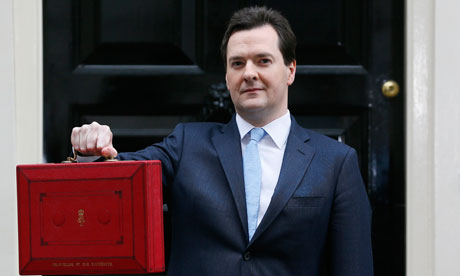This is a dangerous time to push the property market. The chancellor won't invest – yet he's happy for us to

Britons are already up to their eyes in debt … George Osborne. Photograph: Stefan Wermuth/Reuters
Massive public debt: bad. Massive private debt: excellent. Gordon Brown's bubble: economic ruin. George Osborne's potential bubble: economic salvation. Benefits for non-home-owners: unaffordable. Cash bungs for property buyers: essential.
Recite this catechism often and loudly, and over time you too will appreciate the wisdom of the coalition's economic policy.
The consensus over Wednesday's budget was that it was a do-nothing affair, a feeble huddle of small measures washed away in a sea of red ink and broken targets. In terms of central government giving and taking – the traditional stuff of Red Books – it was as small beer as that penny off a pint indicates. But stack up the announcements that don't touch the public balance sheets and the chancellor was strikingly radical.
Because it turns out that Osborne does believe in that apparent epitome of economic loucheness, borrowing to invest. He just wants you and me to do it, using our own wee savings. Sure, No 11 will give us a leg-up, by guaranteeing over £100bn of our loans and sloshing easy money through the banks. But, despite all Vince Cable's exhortations, the chancellor will not do the obvious and less risky thing of public investment.
Have a look at the supplementary document on Help to Buy that the Treasury issued alongside the budget. Billed as a "technical paper", it's not half as innocuous as that sounds. Rather, it's one of the biggest state interventions in the mortgage market in Britain's postwar history.
Help to Buy builds on (no pun intended) existing, largely failed, schemes to help first-time buyers purchase a newly built home. This is in itself problematic, since it's really a bung for the likes of Taylor Wimpey and Barratts and all the other purveyors of identikit housing estates. But warning signs really start flashing with Osborne's proposal to offer banks government guarantees on £130bn of mortgages where the borrowers have low deposits. This isn't just for new homes, it's for any house worth up to £600,000 and it's available not just to first-time buyers, but to people moving up the property ladder.
When the scheme was announced, Ed Miliband's troops successfully got ministers squirming over whether it would be offered to those buying a second home. But that is to miss the bigger point. The first is the risk to public finances: if the property market turns seriously sour, the government stands to make a loss. But the second is the way that ordinary Britons are now being used as economic cannon fodder. Osborne may say, as he did last week, that "you can't cure a crisis caused by debt with more debt". But he doesn't really mean that, because he's just about to launch a policy aimed to get Britain out of its depression – and it relies on households sinking into the red to take part in a property Ponzi scheme.
As I say, the policy is new – but the strategy it's part of has been knocking around for about three decades. The postwar British state used to protect citizens against market failure through the welfare state, through government pump-priming of the economy and through rising wages. But after Thatcher, it was increasingly left to Britons to protect themselves by taking on shares in privatised utilities, by buying up council houses – and by taking on debt, with all the attendant risks. This is what the political economist Colin Crouch has dubbed "privatised Keynesianism": debt is used to reflate the economy, but it is taken on not by the public sector but by individuals, couples, families.
Privatised Keynesianism sounds a bit joyless, but the political classes found something to give it extra zap. Call it housing-market heroin: the special high the Brits get when property prices are really taking off and Sarah Beeny is on the telly explaining how we can all cash in. Thatcher was the first PM to really push housing-market heroin with her right-to-buy programme and her Lawson boom but, with their love of aspiration and Home Ownership Task Force, Blair and Brown knew its potency, too.
Osborne's strategy combines both privatised Keynesianism and housing-market heroin. Yet this is a particularly dangerous time for him to push either. For a start, Britons are already up to their eyes in debt and, outside London, the housing market is flat on its back.
The estate agency Knight Frank estimates that it will take until at least 2019 before property prices are back to the levels of 2007. Add to that the Office for Budget Responsibility's forecast that real wages in Britain in 2015 will be 9% lower than they were in 2010. So the housing market looks less of a sure thing than at any time since 1994, and Britons' personal finances are a wreck. Osborne may think he's found an update of right-to-buy, but it looks more like right-to-be-repossessed.
Still, back to that coalition catechism. Government borrowing to build council housing: forbidden. Individual borrowing to buy an overpriced two-bed flat: encouraged. The way to make the economy stronger is to make it more fragile. And we're all in it together, except really, when it comes to managing your way through this depression, you're on your own.
